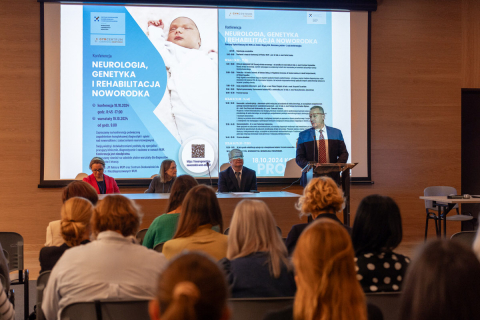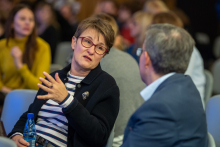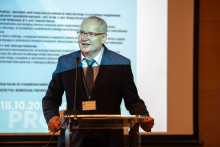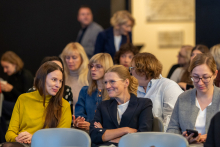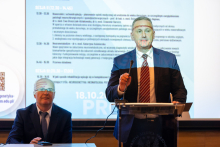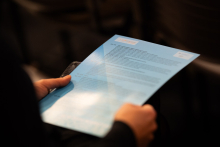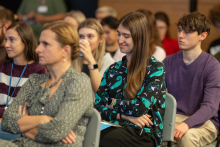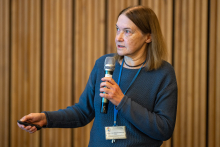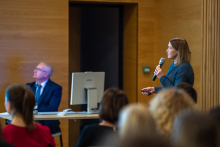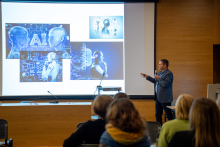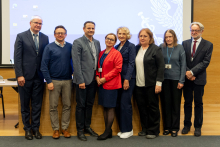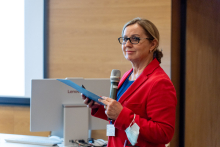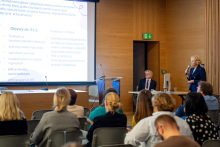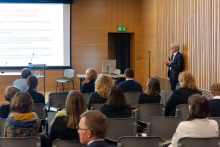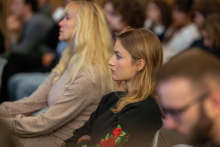The conference was held on October 18 and 19. It was organized by the Center of Excellence for Rare and Undiagnosed Diseases MUW as well as units operating at the Children's Clinical Hospital UCC MUW: Department of Neonatology and Rare Diseases, Department of Child Neurology, Pediatrics and Rare Diseases, Department of Pediatric Neurosurgery, Department of Pediatric Rehabilitation, Laboratory of Neurodiagnostics/Neurogenetics, Department of Medical Genetics, Department of Laboratory Diagnostics and Clinical Immunology of the Developmental Age.
The meaning and purpose of the event
The uniqueness of the event was the combination of three main elements of early care for patients with neurodevelopmental problems: genetic diagnosis, neurological assessment and physiotherapy.
“Early diagnosis means the possibility of early intervention, which is much more effective than that in later stages of development,” said habilitated doctor Krzysztof Szczałuba from the Center of Excellence for Rare and Undiagnosed Diseases of the Medical University of Warsaw. “Improving diagnostics and optimizing newborn care allows pediatricians and specialists in other fields to ensure that infants are more fit, develop better and have greater potential.”
There was also an important emphasis on rare diseases which are one of the strategic research areas of the University.
“At least 800 genetically determined neonatal diseases and many diseases with different causes but equally diverse extent require multi-profile diagnostics,” emphasized habilitated doctor Krzysztof Szczałuba.
Opening of the conference
“You follow wonderful professions as doctors, diagnosticians, physiotherapists or genetic researchers. Every day you fight for the lives and health of these youngest, most defenseless patients,” said professor Marcin Sobczak, Vice-Rector for science and technology transfer, at the opening of the conference.
The Vice-Rector wished everyone successful proceedings and expressed hope that the participants would leave the University equipped with new knowledge, greater competences and ideas that would allow for more effective care of newborns.
Inaugural lecture on the development of the nervous system
It was delivered by habilitated doctor Krystyna Szymańska, Head of the Clinic of Pediatric Neurology, Pediatrics and Rare Diseases.
“The cascade of developmental genes acts in a specific order and depends on complex feedback loops that regulate gene expression, with individual genes operating at different levels of the nervous system.” explained the speaker.
Defects of the central nervous system may be acquired (due to external factors such as folic acid deficiency) or secondary to mutations in a gene. Most often, however, they are multifactorial. Some of these defects occur in the embryonic period, and less often in the fetal period.
The speaker also emphasized that the quality of a premature baby’s experience in the period before the age of 40 weeks of biological age affects the function and structure of the brain, and late consequences of undesirable experiences in the neonatal period may include, among others, hyperkinetic disorders with attention deficit or excessive impulsivity.
Conference topics
In the first session, in addition to the inaugural lecture, doctors Anetta Jeziorek, Barbara Oleksy, Magdalena Szczęsna, Żaneta Acalska, Jakub Świętochowski and Michał Zawadka said when neonatal seizures become the beginning or harbinger of epilepsy or epilepsy syndrome and how early diagnosis of the cause affects the treatment and course of the disease. There was also a clinical case review session, led by habilitated doctor Krzysztof Szczałuba and professor Robert Śmigiel, plus a lecture on the use of whole exome sequencing (WES) in newborns, delivered by professor Maciej Borowiec from GynCenter.
The second session opened with a panel led by professor Bożena Kociszewska-Najman, doctor Ewa Głuszczak-Idziakowska and doctor Sławomir Barszcz regarding achondroplasia and planning medical care for patients suffering from this genetically determined disease.
Professor Kociszewska-Najman told in a word of introduction how the Clinic of Neonatology and Rare Diseases headed by her has developed since 2018, among others, by increasing the number of neonatal intensive care stations (from 4 to 20) or creating an ophthalmology clinic for premature babies.
The professor said: “We have an opportunity to do a lot of things and treat a variety of difficult patients, just because we work with a whole host of clinics. We really appreciate that we can work in this place and help all patients who need to come to us. And this is not only thanks to our clinic, but also to many specialists who work in this hospital.”
Achondroplasia is the most common non-lethal skeletal dysplasia, accounting for approximately 60% of skeletal dysplasias, and affects over 360,000 people worldwide. The incidence is estimated at 3.72-4.6 per 100,000 births. The most serious and life-threatening complication in infancy and early childhood is stenosis of the foramen magnum, which leads to breathing disorders during sleep, including obstructive sleep apnea.
Doctor Ewa Głuszczak-Idziakowska said: “What all the consensuses that deal with planning the treatment of children with achondroplasia emphasize is that we, as professionals, must treat the parents of our patients, and then adult patients, as full participants in the observation of the clinical condition and treatment.”
A new perspective on neurometabolic disorders, from the early diagnosis of inborn metabolism defects to the discovery of new biomarkers specific to central nervous system disorders, was presented by doctor Katarzyna Kuśmierska. Habilitated doctor Krystyna Szymańska also talked about neurometabolism.
Artur Bartochowski and Anna Rakowska dlivered the last lecture titled “How rehabilitation fits into the comprehensive examination and treatment of newborns”.
The first day of the conference ended with a round table discussion.
Workshops
The event program also included workshops divided into two parts: a diagnostic panel and a development panel.
The diagnostic panel included workshops:
- “Neurodevelopmental assessment and orthopedic examination of newborns”, conducted by habilitated doctor Krystyna Szymańska, Artur Bartochowski and Anna Rakowska. The workshops was devoted to Prechtl’s method, assessment of body symmetry, examination of hip joints and distinguishing between postural foot from those requiring orthopedic treatment, among others.
- “Possibilities of early and therapeutic intervention to be implemented immediately” led by Artur Bartochowski and Anna Rakowska. Participants of the workshop learned about the most common problems related to the psychomotor development of newborns and the basic disorders of the musculoskeletal system.
The development panel consisted of workshops:
- “Monitoring of aEEG (amplitude integrated EEG) – application in the neonatal unit” led by doctor Barbara Oleksy. Participants of the workshop gained practical skills in assessing a newborn’s aEEG examination.
- “Interpretation of results of genetic tests in newborns” conducted by habilitated doctor Agnieszka Pollak, habilitated doctor Krzysztof Szczałuba and professor Robert Śmigiel. The workshop covered the rapid WES technique, indications for genetic assessment of newborns, examples of results that are difficult to interpret, unclear or inconclusive, and results that enable quick intervention, among others.
